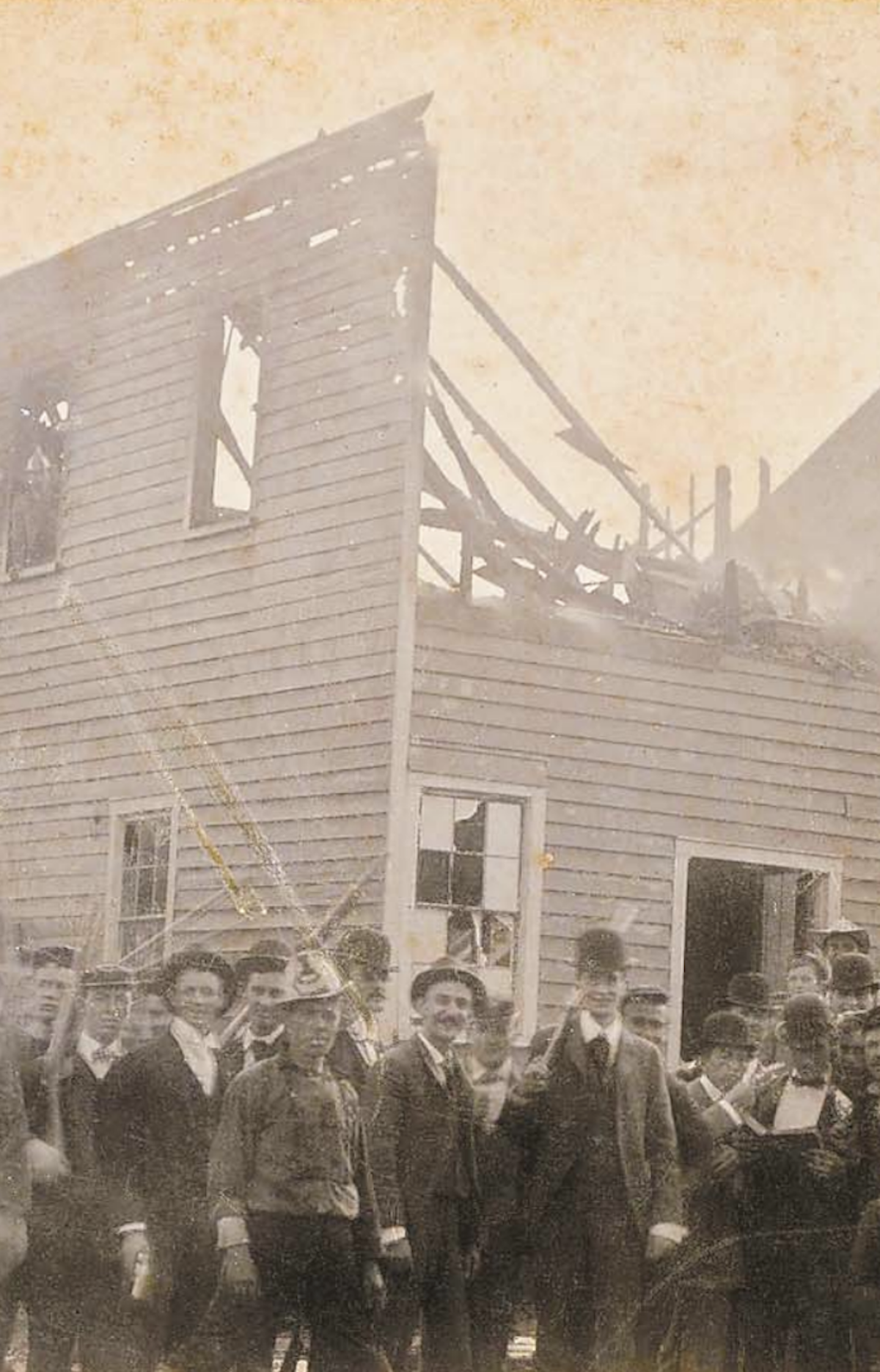
OPINION
Milton Coleman
Destruction of The Daily Record of Wilmington, said to be the only black-owned daily newspaper in the United States at the time, by white supremacists. Photo, Courtesy of North Carolina Office of Arhcives & History
Donald J. Trump’s latest rants against immigrants are bringing his campaign closer and closer to the strategically crafted and undeniably racist propaganda that powered the White supremacist insurrection in Wilmington, N.C. in 1898, when what is now considered ‘the quiet part’ was as loud as could be.
The cultural lies, like the talk of Haitian immigrants in Ohio eating cats and dogs, have been eclipsed by lies about God-given humanity.
“These people are animals…” he said of immigrants as a group, speaking to a cheering crowd in Prairie du Chien, Wisconsin.
And as for Vice President Kamala Harris, the native-born American daughter of immigrant parents: “She is mentally impaired. …She was born that way.”
A week later, he claimed that there were 13,000 immigrants in the nation who were destined to be “murderers” from the moment they were born. “I believe it’s in their genes. And we got a lot of bad genes in our country right now,” the Republican nominee for President told interviewer Hugh Hewitt.
Trump built his political base and won the presidency in 2016 on the issue of immigration, an issue which for him is less about policy, and more about people–people whose family immigration histories are virtually the same as his own, except they don’t look like him, and they don’t come from Europe.
Demonizing those from countries, nations and communities of color is a central tenet of the Trumpist political creed–a veritable ideology that is broader and deeper than the person, the party or any candidate in next month’s elections.
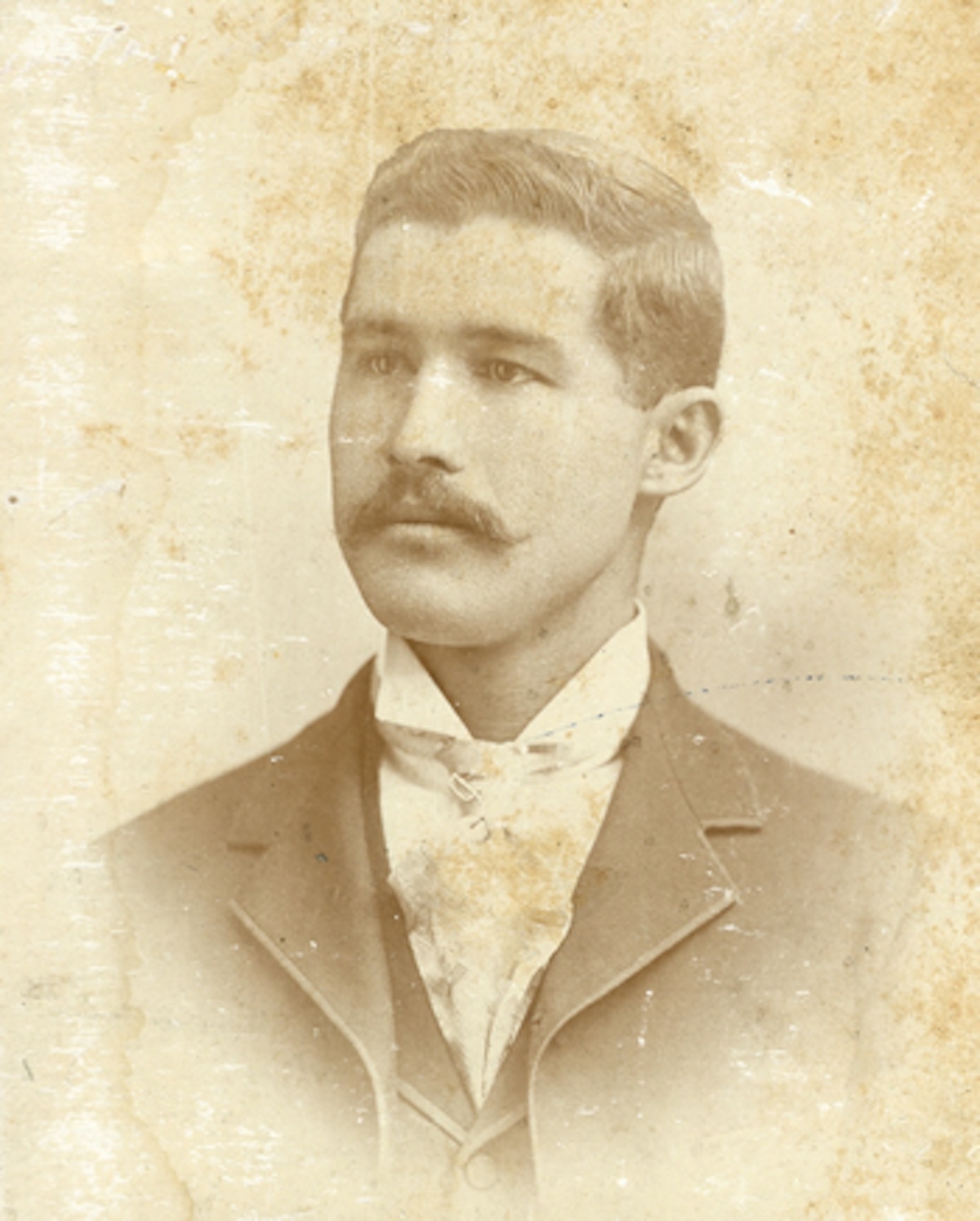
Sometimes he calls his villains by name; at other times it’s simply “they” or “them” who are the objects of his ire. Whatever the word, the point is the same: “they” are unfit to be full-fledged Americans, neither on the basis of national or international law, nor by civil or human standing; and should never be empowered.
The Wilmington insurrectionists felt somewhat the same about genes and governance. They considered it neither true nor self-evident that all “are created equal” and “endowed by their Creator with certain inalienable Rights,” and didn’t hesitate to say so in a “White Declaration of Independence” issued during the coup.
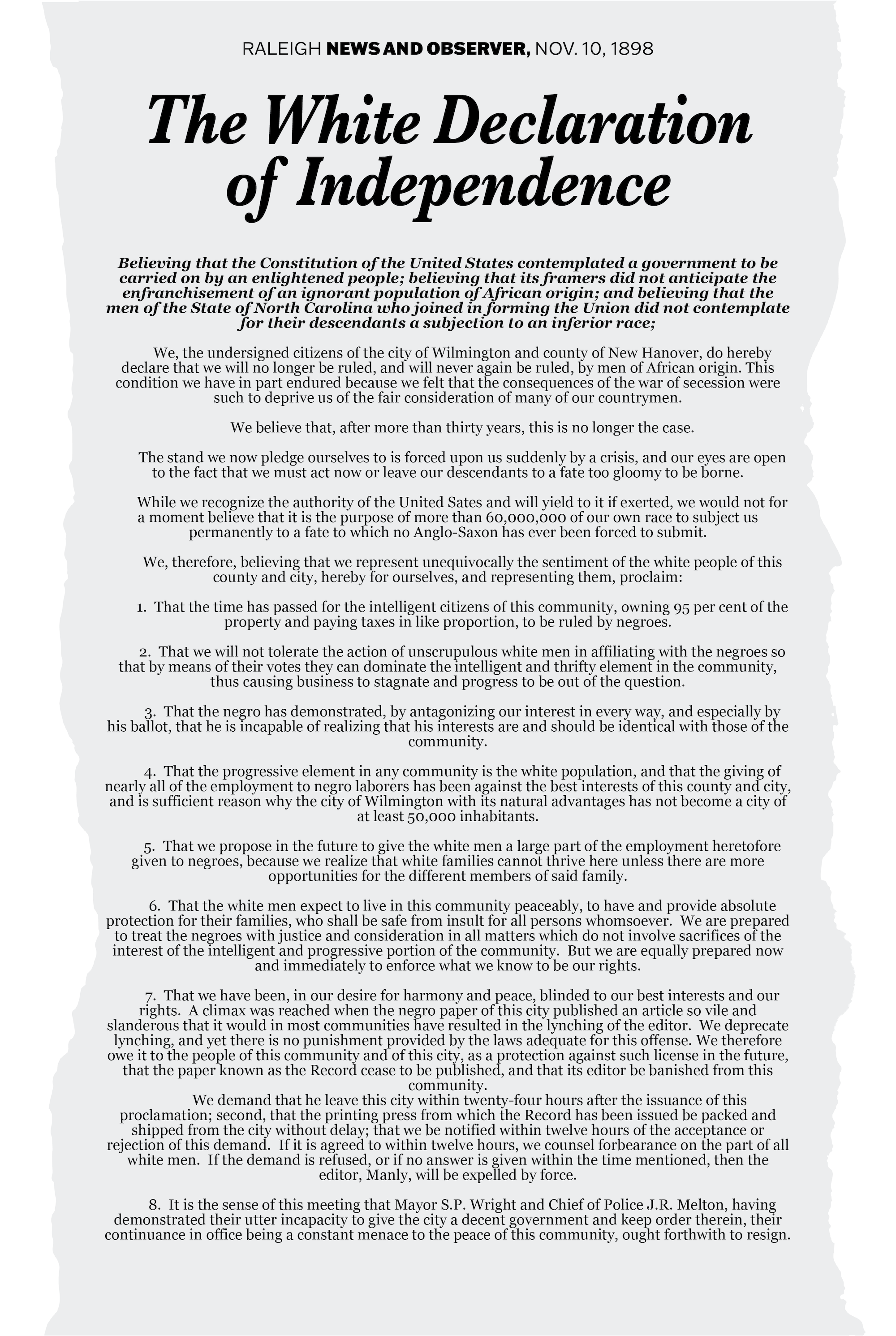
“So you, the framers of the Constitution “did not anticipate the enfranchisement of an ignorant population of African origin,” they claimed, and “the men of the State of North Carolina who joined in forming the Union did not contemplate for their descendants a subjection to an inferior race…. (See https://people.uncw.edu/schmidt/Misc/1898/1898prelude5new.html)
“We…do hereby declare that we will no longer be ruled, and will never again be ruled, by men of African origin.”
A couple of days later, a local White–owned newspaper, the Wilmington Messenger, applauded the end of “Negro domination” and effectively declared Wilmington great again:
“We must hope that by far the greater part of the negroes in this city are anxious for the restoration of order and quiet and the ‘old order’—the rule of the White people.” (See https://newspapers.digitalnc.org/lccn/sn91068368/1898-11-12/ed-1/seq-1/)
“If they are not, they are too simple to be reasoned with and know not their condition and what is best for them. …The tables are turned now and forever. Never more shall Sambo and Josh ride rough–shod over the White man who befriended and helped them.”
Immigration, the words, and the people are an inextricable component of Trump’s relentless ‘we-me-and-I’ against ‘they-and-them’ political propaganda, and also a perhaps less considered throughline in the comparisons of the Wilmington insurrection to the one at the Capitol on January 6, 2021.
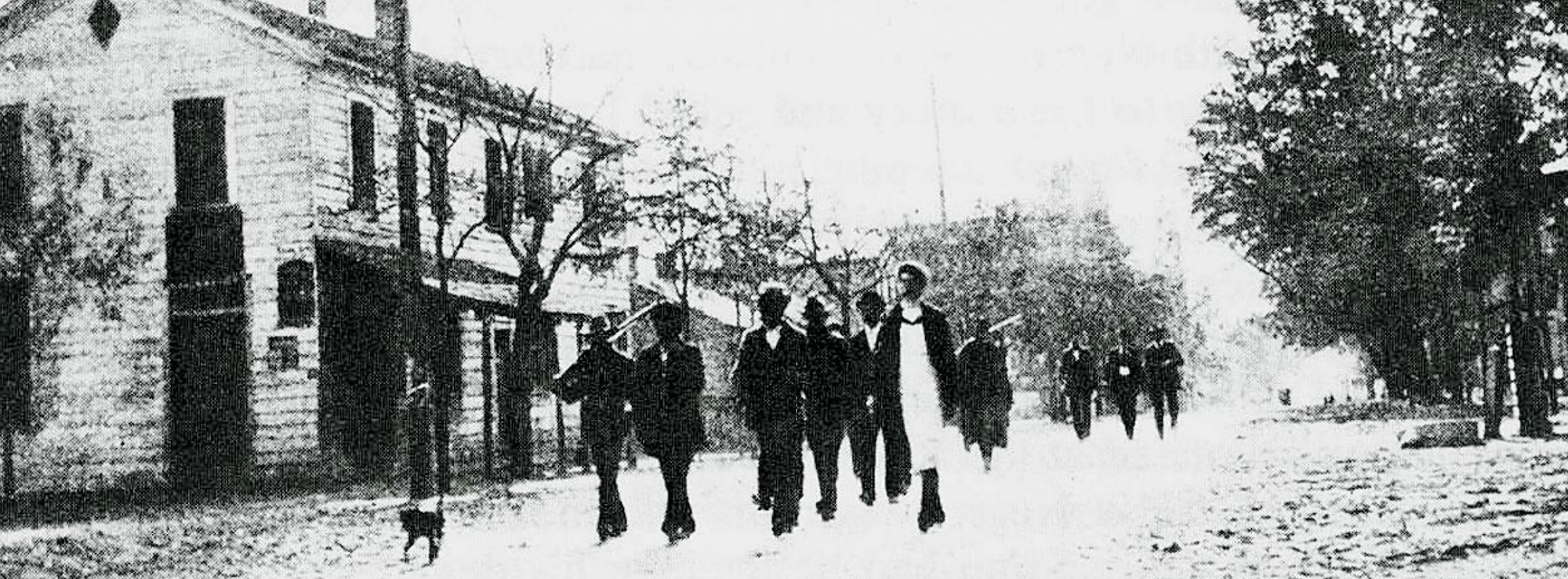
Demonizing Immigrants of Color
On the one hand, immigrants of color and their families are always the demons in Trump’s lie-laced rhetorical indictments.
Examples abound. They include the following: the ‘Birtherism’ lie about Barack Hussein Obama, the ‘Mexican rapists’ lie that launched his campaign, and the s—hole African countries lie while in the White House. More recently, in addition, he has spoken about the lies about the Haitians in Ohio, the lies about Venezuelans emptying out of jails and mental institutions and taking over Colorado’s third largest city. Also, he has used very personalized and vitriolic lies about Harris, the native-born American daughter of immigrant parents.
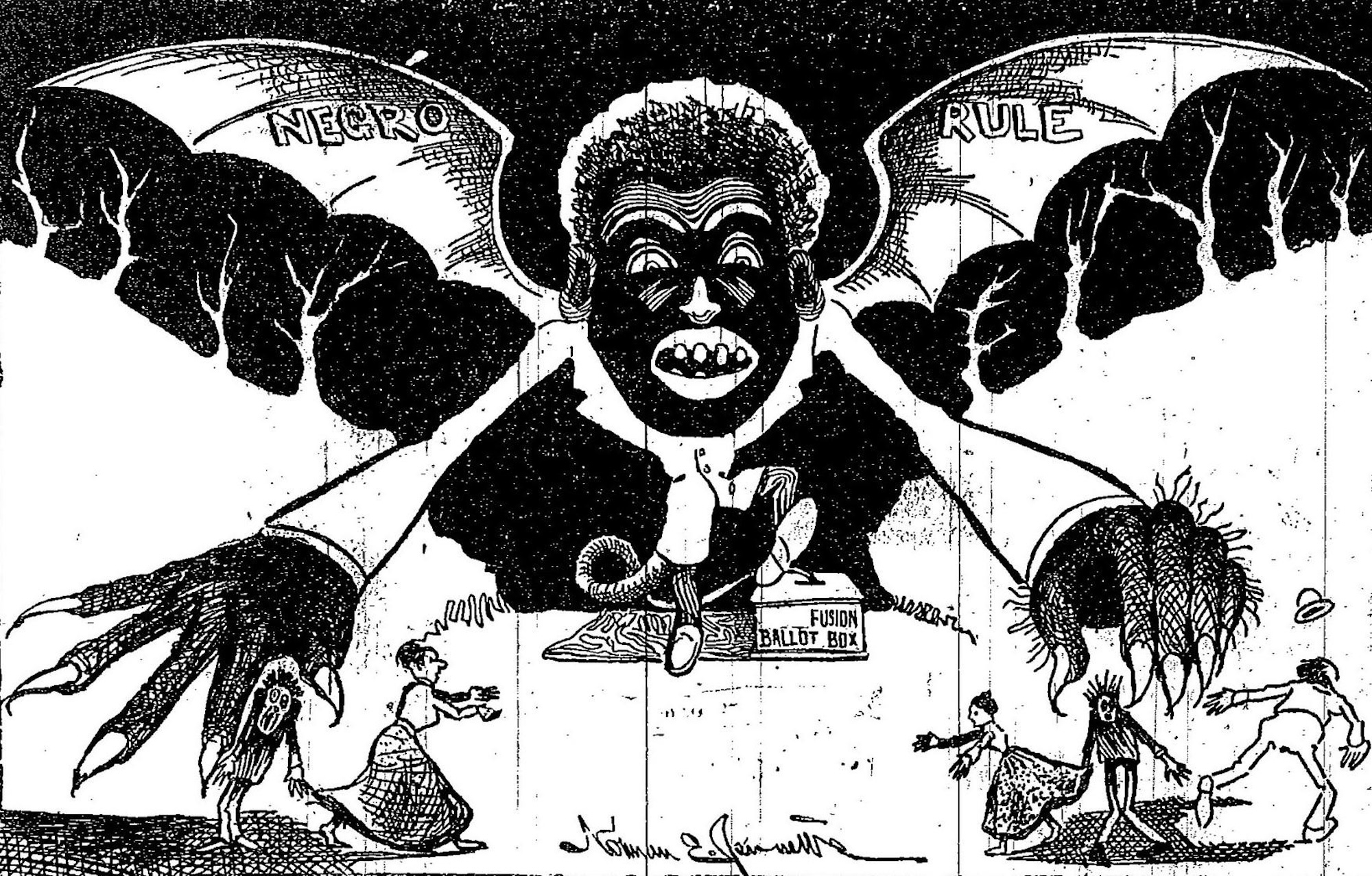
On the other hand, the single largest group of generic ‘immigrants’ at the time of Wilmington was not those coming from Europe, like Trump’s grandfather. He arrived in the U.S. from Bavaria in 1885 under many of the same policies and processes that his grandson vehemently disparages.
Instead, the largest group was some four million ethnic African Americans, most born on U.S. soil and refugees from the Civil War, who in their own time had migrated into the entire U.S. citizenship on a path paved by the Reconstruction Amendments to the Constitution of the United States – including the right to vote.
Their success stoked White grievance and ignited political wrath throughout the South then in so many ways akin to the way that Black, Brown, and Asian immigrants seem to do with Trump, Vance, and their supporters.
History Lessons
Henry Louis Gates, Jr., the Harvard University historian, argues that now is an excellent time to look back and learn.
“Few American historical periods are more relevant to understanding our contemporary racial politics than Reconstruction. Think of the fundamental questions that the period study forces us to consider,” he writes in “Stony the Road: Reconstruction, White Supremacy, and the Rise of Jim Crow.”
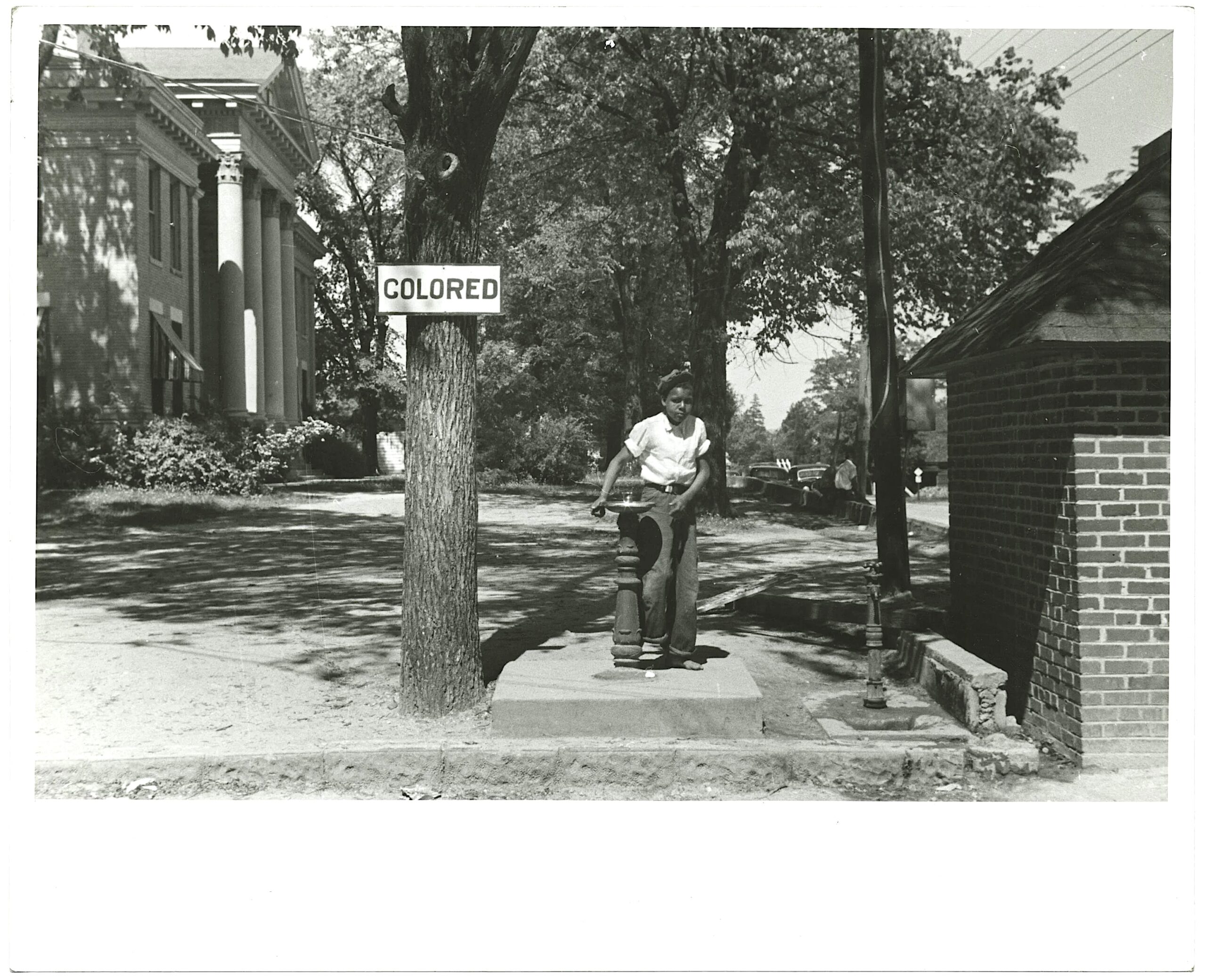
“Who is entitled to citizenship? Who should have the right to vote? What is the government’s responsibility in dealing with terrorism? What is the relationship between political and economic democracy?”
There has been considerable debate in the years since Trump left office regarding the legal aspects surrounding the January 6, 2021, insurrection at the Capitol that followed Trump’s “Stop the Steal” rally, as well as his role in it and comparisons to Wilmington.
Several leaders of the Proud Boys and the Oath Keepers have been convicted of seditious conspiracy for their role in the violence, and Trump himself is facing federal charges of denial of voting rights based on an 1870 law initially targeting Ku Klux Klan terrorism.
Looking Forward
Former U.S. Attorney General Eric Holder also argues the urgency of looking ahead.
“On January 6, we witnessed an attempted coup that might have seemed wholly unprecedented and disruptive, but make no mistake: It was actually the culmination of an effort years in the making, one that has only accelerated in the months since,” Holder writes in “Our Unfinished March: The Violent Past and Imperiled Future of the Vote – A History, A Crisis, A Plan.”
“That’s why, in its aftermath, legislatures across the country, Republican elected officials, and conservative media outlets haven’t been devoted to figuring out how to prevent an uprising like that from happening again. Instead, too many have been working strategically and methodically to make sure that next time, the coup can succeed.”
*
For Trump, Vance, and their followers, the immigration issue in this campaign, as in the past, is less about policy and overwhelmingly about people, as were the Wilmington events were also primarily about people.
At the time of the Civil War, the United States was essentially a Black and White nation, about 86 percent White and 14 percent Black. Native Americans, on and off reservations, plus Chinese and Japanese, totaled about 1 percent.
One-third of the then nation, 12 of the 36 states, formed an “unrecognized breakaway republic,” in diplomatic terms, that became known as the Confederate States of America, which launched and subsequently lost a war against the United States of America, another sovereignty, so to speak.
The formerly enslaved were the likes of refugees of war who sought and obtained asylum, as many of those crossing all U.S. borders seek to do now.
Even before the war, their movement about the country of those like them was governed less by the still young federal government and more by the states, who controlled their borders, and chattel slavery, too.
“Whether to protect slavery, to eliminate Black labor competition, or simply for racism’s sake, lawmakers across the country and in Congress legislated against Black mobility…,” Michael A. Schoeppner, a history professor at the University of Maine at Farmington, writes for the JStor online site.
“Free Black migrants, both African American and foreign-born…faced closed or regulated borders from Florida to Oregon…Black migrants who violated state bond laws or Black exclusion provisions turned out to be the first illegal immigrants in American history.”
Meanwhile, some two million people immigrated the the U.S. from abroad during the 1860s, and that number more than doubled to five million during the 1880s. By 1866, immigrants were 13 percent of the U.S. population, about the same as the Black population at the time.
The immigrants, mainly from Germany and Ireland, looked like those who had come and settled on the Native Americans’ land earlier. Yet, they posed a 19th- century DEI challenge of sorts because their “origin stories, last names, and religious beliefs set them apart,” Laura Reston wrote in The New Republic.
Many were Catholic, for instance, and some established Whites questioned their would–be patriotism, arguing that they were likely to be more loyal to the Pope than to the United States, and suggesting they were threats to national security.
There also were claims that many of them lacked the social skills and intellectual know–how to assimilate to the American way of life, similar to the allegations that, for example, Haitians are imposing alien culture on Middle Americans in Ohio.
Yet, the freedmen/immigrants posed more vexing challenges. Not only did most of them not look the same as either of the others, there also were so many of them they could vote in local elections, and that is precisely what they did, especially in North Carolina.
At the time, Wilmington was the state’s largest city and the seat of New Hanover County. The populations of both were majority Black, and the state’s population was nearly 40 percent Black, its highest ever.
Their success was a model for some. But it was a cause for despair and grievance for others, similar to many current concerns.
Some White people were “willing to accept some black advancement, so long as Whites held the reins of power,” Duke University history professor Timothy B. Tyson wrote in “The Ghosts of 1898: Wilmington’s Race Riot and the Rise of White Supremacy,” a 2006 series of special reports for the Raleigh News & Observer.
“But Black economic gains also provoked many poor Whites who competed with them, and wealthy Whites persistently encouraged animosity between poor Whites and Blacks in a divide-and-conquer strategy.”
“Negroes were given preference in the matter of employment…,” Harry Hayden, at the time a reporter for the Wilmington Morning Star, wrote. “And this economic condition was aggravated considerably by the influx of many Negroes, and Wilmington was really becoming a Mecca for Negroes and a City of Lost Opportunities for the working-class Whites.
“Several Negroes were members of the city’s Board of Aldermen, Negro policemen patrolled the beats within the town limits. Negro firefighters were crowding out White fire laddies, finally disrupting the latter’s volunteer fire department, which had been staffed by high-class German and Irish citizens. Negro lawyers were practicing in the state, city, and federal courts.”
Two days after the coup, a local White-owned newspaper, the Wilmington Messenger, applauded the end of “Negro domination” and effectively declared Wilmington great again.
“If they are not, they are too simple to be reasoned with and know not their condition and what is best for them. …The tables are turned now and forever. Never more shall Sambo and Josh ride rough–shod over the White man who befriended and helped them.”
The leaders of the coup issued a “White Declaration of Independence” that included a promise to make Black jobs in town White again.
“We propose in the future to give the White men a large part of the employment heretofore given to negroes, because we realize that White families cannot thrive here unless there are more opportunities for the different members of said family,” it read.
Building An Anti-Immigrant Base
Trump’s anti-immigration rhetoric has helped him develop a present-day political base not unlike that of the insurrectionists in Wilmington, New York University historian Steven Hahn, author of “Illiberal America: A History,” wrote in the New York Times recently:
“When Trump questioned Barack Obama’s legitimacy to serve as president, a project that quickly became known as ‘birtherism,’ he made use of a Reconstruction–era racist trope that rejected the legitimacy of Black political rights and power.
“In so doing, Trump began to cement a coalition of aggrieved White voters. They were ready to push back against the nation’s growing cultural diversity – embodied by Mr. Obama – and the challenges they saw to traditional hierarchies of family, gender, and race.”
University of Georgia professor Cas Mudde has described such ideological trappings to The Atlantic as “xenophobic nationalism,” a derivative of the ‘them–against–us’ rhetoric of the Nativist movement that flourished in response to 19th century immigration from Europe.
Trump’s self-identity seems to fit that bill. “You know what I am? I’m a nationalist. Nationalist! Use that word! Use that word!” he proclaimed at a rally in Houston in 2018.
He has made race a core element of his political brand. Washington Post columnist Philip Bump wrote:
“‘Make America Great Again’ was always inherently about turning back the clock in the United States to unwind changes that included diversity. Over time, it became impossible to disentangle Trump’s views on race from his politics…Trump’s comments about crime and policing and the border and Democrats were interlaced with appeals to racial resentment.”
Trump has made Obama and Harris, two ultra–prominent, darker–skinned, and native–born Americans with foreign–born parents, living personifications of his signature campaign propaganda, and perhaps even more.
“For Trump, it almost seems that the fact of Obama, the fact of a Black president, insulted him personally…. Trump truly is something new – the first president whose entire political existence hinges on the fact of a Black president,” Ta-Nehisi Coates wrote shortly after Trump came into office. (See https://www.theatlantic.com/magazine/archive/2017/10/the-first-white-president-ta-nehisi-coates/537909/)
As political piñatas, they are much to Trump, not only as the freedmen/immigrants were to White supremacists in Wilmington, but also as the infamous “welfare queen” was to Ronald Reagan’s 1976 campaign and convicted armed robber and rapist Willie Horton was to George H.W. Bush’s campaign in 1988.
But now is a different time, and the former president and Republican Party leader is a distinct and more desperate politician than in the past, The New York Times columnist Jamelle Bouie wrote just last month:
“Where once Donald Trump attracted only the right–wing fringe of American politics, now he leads it. Where once he kept some distance from agitators and provocateurs…now they’re at the center of his campaign. And where once he merely inspired extremists to act, now he points them directly at the objects of his rage.”
Epilogue
Trump has promised that if returned to the presidency, he will deport millions of immigrants – a pledge cheered in boisterous chants of “Send them back” and on placards reading “Mass Deportations Now” during the Republican convention. It, too, has a Wilmington–era counterpart.
A vibrant colonization movement then encouraged free ethnic Africans to self–deport, and many in the party of Lincoln, including President Lincoln himself, were among its supporters.
“While he strongly opposed the institution of slavery, he didn’t believe in racial equality, or that people of different races could successfully integrate,” journalist Farrell Evans writes on the History online site. “And unleashing nearly 4 million Black people into white American society – North or South was a political nonstarter.”
A year before issuing the Emancipation Proclamation, Lincoln issued another executive order that freed 3,100 enslaved in the District of Columbia and authorized reparations payments of up to $300 to former slaveholders for every person set free. It also offered up to $100 each to any formerly enslaved who would self–deport to Liberia or Haiti.
There were relatively few takers there and then; not so later.
“In the weeks and months following the coup, more than 2,000 Blacks fled the city. And a black majority city almost overnight became a white supremacist stronghold,” Zucchino said in a 2020 interview on NPR.
“The effect of the coup and the aftermath was that blacks did not hold elected or appointed offices in Wilmington or eastern North Carolina for another 70 years.”
They self–deported, migrating with a hope for better lives in the land of their birth, land that Richard Wright nevertheless would later describe as “alien soil,” yet places where they could thrive, under, he wrote, “the warmth of other suns.”
This is the first of a series of articles reflecting on the White supremacist Wilmington Insurrection of 1898 and its implications for today. The writer, Milton Coleman is a former Deputy Managing Editor of the Washington Post.








